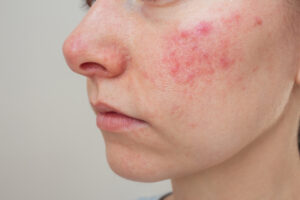Explore home remedies for rosacea symptoms: regular, mindful exercise, and specific supplements like Omega-3, Probiotics, and Quercetin. However, always consult with a healthcare professional before starting a new regimen.
Introduction
Rosacea is a chronic and potentially disruptive condition that predominantly impacts facial skin. It is commonly marked by episodes of exacerbation and remission. Symptoms generally begin with episodes of flushing, but as the condition progresses, other symptoms such as persistent redness, visible blood vessels, and pimples may appear. While the cause of rosacea remains unknown, it is thought to be a combination of hereditary and environmental factors. Although there’s no cure, treatments can control and reduce the signs and symptoms.
The Importance of Seeking Medical Advice
While home remedies might offer some relief from rosacea symptoms, it’s crucial to seek medical advice. This condition can progress without proper treatment, potentially leading to more severe complications such as vision problems or an enlargement of the nose. A healthcare professional can accurately diagnose rosacea, distinguishing it from other similar skin conditions. They can also provide a comprehensive treatment plan, which may include lifestyle changes, medications, or even laser therapies, tailored specifically to your symptoms and skin type. Remember, self-management strategies complement medical treatment, they do not replace professional healthcare advice.
The Role of Diet in Rosacea Management
Foods to Avoid
- Rosacea can be exacerbated by certain foods and beverages that trigger flare-ups.
- Foods high in histamines such as cured meats, aged cheese, and citrus fruits, might lead to increased redness and inflammation.
- Spicy foods can cause rosacea to flare due to their heat and potential to irritate the skin.
- Alcohol, especially red wine, is another common trigger due to its vasodilating properties.
- Hot drinks such as coffee or hot cocoa may cause a similar response.
Therefore, by identifying and avoiding these potential triggers, you may be able to reduce the frequency and severity of rosacea symptoms. Remember, everyone is unique and your triggers may differ from those of others; keeping a food diary might help identify your personal triggers.
Natural Topical Remedies
- Green Tea Cream: Green tea boasts potent anti-inflammatory properties that can help soothe rosacea symptoms. A topical cream containing green tea may reduce redness and inflammation when applied to the affected skin area. The antioxidants in green tea, especially epigallocatechin gallate (EGCG), have been found to have significant benefits for skin health. However, always do a patch test before using any new product to ensure it doesn’t cause further irritation. While green tea cream may offer some relief, it should be used as a part of a comprehensive treatment plan and not as a standalone treatment.
- Oatmeal Masks: Oatmeal is renowned for its soothing properties which can be advantageous for people with rosacea. An oatmeal mask can help calm inflamed skin, reduce redness, and provide gentle exfoliation without irritating. The avenanthramides in oatmeal are potent antioxidants that also exhibit anti-inflammatory and antihistamine properties. A simple homemade oatmeal mask, created by mixing finely ground oatmeal with enough water to form a paste, can be applied to the affected area. Leave the mask on for about 10-15 minutes before gently rinsing with warm water. As with any new treatment, it’s a good idea to do a patch test first to ensure no adverse reactions occur. Similarly to green tea cream, an oatmeal mask should be considered as part of a larger treatment strategy, and not a cure-all solution.
- Chamomile Compresses: Chamomile is a popular herb known for its calming and anti-inflammatory properties, which can be beneficial for those suffering from rosacea. A chamomile compress can help soothe the skin, reducing redness and inflammation. To prepare a chamomile compress, steep a few chamomile tea bags in boiling water, let it cool, and then refrigerate. Once the solution is chilled, soak a clean, soft cloth in the chamomile solution and apply it to the affected areas. It’s important to ensure you’re not allergic to chamomile before trying this remedy as it could worsen the symptoms if you’re allergic. Remember to consider chamomile compresses as a part of a wider treatment approach for rosacea, rather than a singular solution.
- Lavender Essential Oil: Lavender oil is renowned for its anti-inflammatory and calming properties, making it a potentially beneficial addition to a rosacea skin care regimen. Applying a diluted mixture of lavender oil and a carrier oil like coconut or jojoba oil can help to soothe the skin and reduce redness and inflammation. However, it’s crucial to conduct a patch test before using lavender oil on your face, as some people might have an allergic reaction to it. As with the previous remedies, lavender essential oil should be viewed as a component of a comprehensive treatment plan for rosacea, not a standalone cure.
- Geranium Essential Oil: Geranium oil is regarded for its anti-inflammatory properties and its ability to assist in balancing the skin’s natural oils, making it a suitable choice for managing rosacea symptoms. A diluted solution of geranium essential oil and a carrier oil, such as almond or grapeseed oil, can lessen redness and irritation when applied to the skin. Conduct a patch test before using geranium oil on your face to avoid potential allergic reactions. Remember, as with other remedies, geranium oil is best used as a part of a broader rosacea treatment strategy, not as a sole solution.
- Tea Tree Essential Oil: Tea tree oil has been celebrated for its antimicrobial and anti-inflammatory properties, which may prove beneficial in managing rosacea symptoms. Application of a diluted mixture of tea tree oil and a carrier oil such as olive or sunflower oil can help to alleviate skin inflammation and redness. However, as with other essential oils, it is critical to perform a patch test before applying tea tree oil to your face, as it can cause allergic reactions in some individuals. Remember, tea tree oil should be considered as part of an overall treatment plan for rosacea, not a complete solution in itself.
- Helichrysum Essential Oil: Known for its anti-inflammatory and antioxidant properties, Helichrysum essential oil may be beneficial in managing the symptoms of rosacea. It can help to reduce redness and inflammation, and its emollient properties can assist in moisturizing and soothing the skin. A patch test is essential before applying Helichrysum oil to your face, as it might cause an allergic reaction in some. As with other essential oils, it should be used as a part of an overall treatment plan for rosacea, not as an all-in-one solution.
- Evening Primrose Oil: Evening primrose oil is lauded for its rich concentration of omega-6 fatty acids and gamma-linolenic acid, which are known to help reduce inflammation and improve the health of the skin’s lipid barrier. These properties can prove beneficial in treating the redness and inflammation associated with rosacea. When applying evening primrose oil to your face, you should first dilute it with a carrier oil like almond or jojoba oil. A patch test is recommended prior to application to avoid potential allergic reactions. Like other essential oils, evening primrose oil should be used in conjunction with other remedies in a comprehensive rosacea treatment plan, rather than as a standalone solution.
Lifestyle Changes
Sun protection is crucial for individuals dealing with rosacea as sun exposure can exacerbate symptoms. It’s advisable to wear a broad-spectrum sunscreen with an SPF of at least 30 every day, regardless of the weather. This will protect your skin from harmful UVA and UVB rays, which may trigger rosacea flare-ups. Additionally, wearing wide-brimmed hats and seeking shade whenever possible can also help protect your skin from the sun. Remember, sun protection is an essential part of a comprehensive rosacea treatment plan.
You may also find make-up is irritating to your skin and causes flare-ups. Stick to hypoallergenic make-up but even then you may have difficulty finding one that does not irritate your skin.
Managing Stress
Managing stress effectively is another key component in a comprehensive rosacea treatment plan. High-stress levels can trigger flare-ups, so it’s crucial to incorporate stress-relieving activities into your daily routine. These could include:
- Mindfulness and Meditation: Practices such as yoga, tai chi, or simple mindfulness exercises can help reduce stress levels. These methods focus on calming the mind and body, promoting a sense of peace and relaxation.
- Physical Activity: Regular exercise is proven to help reduce stress and improve overall well-being. This doesn’t necessarily mean strenuous workouts; even a brisk walk or light aerobic activity can make a significant difference.
- Healthy Sleep Habits: Ensure you are getting enough restful sleep. Establishing a regular sleep schedule and making your sleeping environment as comfortable as possible can help in managing stress.
- Balanced Diet: A nutritious, well-balanced diet can also influence your stress levels. Try to incorporate plenty of fruits, vegetables, lean proteins, and whole grains into your meals, and limit your intake of processed foods and sugar.
Remember, it’s important to find stress management techniques that work for your lifestyle and preferences. Everyone is different and what works for one person might not work for another. Experiment with different methods and find what suits you best. Stress management is not just beneficial for managing rosacea, but it can improve your overall health and well-being.
Exercise
Regular, gentle exercise plays a pivotal role not only in overall health, but also in managing conditions like rosacea. Engaging in mild to moderate physical activity can help regulate the body’s hormonal balance, which can indirectly influence the frequency and severity of rosacea flare-ups. Additionally, exercise aids in stress management, a key factor in controlling rosacea. However, it’s crucial to avoid overly strenuous workouts, as they can cause the body to overheat—an identified trigger for rosacea flare-ups. Balanced, regular exercise such as brisk walking, cycling, or swimming can be a beneficial addition to your rosacea management plan. Remember, the goal is to improve overall health without causing additional stress to the body.
Herbal Supplements
Certain herbal supplements may also provide relief from rosacea symptoms. Here are a few worth considering:
- Omega-3: Omega-3 fatty acids, found in fish oil and flaxseed, are known to reduce inflammation and may help to alleviate redness and irritation associated with rosacea. It’s advisable to consult with your healthcare provider before starting any new supplement regimen.
- Probiotics: Probiotics are beneficial bacteria that reside in our digestive tract. They can bolster the immune system, improve digestion, and enhance skin health. Probiotic supplements can help balance gut flora, which might be beneficial for individuals with rosacea.
- Quercetin: Quercetin is a plant pigment (flavonoid) found in many fruits, vegetables, leaves, and grains. It’s known for its antioxidant properties, which help fight free radicals, reduce inflammation, and may reduce symptoms of rosacea. As always, it’s essential to consult with a healthcare provider before beginning any new supplement, including quercetin.
Conclusion
In summary, managing rosacea at home can be simplified by integrating a few practices into your routine. Consider exercising regularly, but mindfully, to avoid extreme body heat and stress. Certain herbal supplements like Omega-3, Probiotics, and Quercetin may provide relief from rosacea symptoms by reducing inflammation, bolstering the immune system, and fighting free radicals.
However, it’s paramount to remember that each individual is unique, and what works for one may not work for all. It’s essential to consult with a healthcare provider or dermatologist to tailor a rosacea management plan that aligns with your specific needs and health profile. Not all supplements are suitable for everyone, and professional medical advice should always be sought before embarking on any new health regimen.
Please note that while these remedies can help manage symptoms, rosacea is a medical condition that typically requires professional treatment. Always consult a healthcare professional before trying new treatments.


